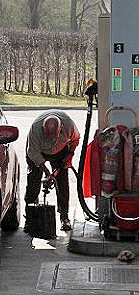Maude Urging Public To Store Petrol At Home Risks Life-Threatening Injury
Health & Safety (Ignorance) Gone Mad!
The full extent of the Tory government’s disregard for the health, safety and welfare of workers and the country’s citizens could not be more blatantly exposed on Wednesday of this week; than by the crass and stupid statement from Cabinet Office Minister Frances Maude urging the public to store petrol in jerry cans at home!
It further exposes the astonishing lack of understanding of health & safety and common sense.
 Yesterday (Thursday 29th March), a woman in York suffered serious burns when petrol ignited as she was decanting it in the kitchen of her home. She suffered in fact 40% burns as a result and was rushed to the burns unit at Pinderfields Hospital in Wakefield.
Yesterday (Thursday 29th March), a woman in York suffered serious burns when petrol ignited as she was decanting it in the kitchen of her home. She suffered in fact 40% burns as a result and was rushed to the burns unit at Pinderfields Hospital in Wakefield.
Many feel that her actions and subsequent injuries were as a direct result of Maude’s outrageous suggestion to motorists.
Following Maude's pronouncements, the Fire Brigades Union appeared on national TV news explaining that petrol vapour is easily ignitable in a confined space, and that people should not store petrol at home.
According to reports on the BBC News website today (Friday 30th March) a fire service spokesman said:
"Her daughter asked her mum for petrol because she had run out. The cooker was on and the fumes ignited."
Station manager Lee Smith, whose Acomb crew attended the fire, said:
"The people were cooking their tea and dispensing petrol from a container to a glass jug. The vapour then ignited, the jug was then spilt which obviously ignited as well and the person involved in the decanting was consumed by the flames. Her daughter phoned 999 and was obviously extremely distressed."
Her condition is not known but a North Yorkshire Fire Service spokesman described the burns as severe.
Two firefighters wearing breathing apparatus extinguished the fire in the kitchen and removed the remaining petrol.
A North Yorkshire Fire Service spokesman said:
"Members of the public should take extreme care when handling and storing petrol and be aware of the risks associated with incorrect use and storage of fuel. Never bring petrol inside your home. If you do smell petrol fumes in a garage or outbuilding ventilate the area and make sure nobody smokes or turns electrical switches on or off. The slightest spark could cause an explosion."
North Yorkshire Fire Service on Thursday issued a warning about the storage of petrol at domestic properties.
"Fuel should be stored away from the house in either a shed or a garage, well away from people and anywhere where it might be close to a naked flame or other source of ignition," it said.
The HSE website advice regarding storage of petrol says:
The Petroleum Spirit (Motor Vehicles etc.) Regulations 1929 and the Petroleum Spirit (Plastic Containers) Regulations 1982 limit the amount of petrol that can be kept in a domestic garageor within six metres of a building (e.g. most domestic driveways). The limit is a maximum of two suitable metal containers each of a maximum capacity of ten litres and two plastic containers (which have to be of an approved design) each of a maximum capacity of five litres. These limits also apply to any containers kept in a vehicle parked in the garage or on the driveway (but not to the internal fuel tank of the vehicle). Under no circumstances should the petrol containers be stored in the home itself.
On the social networking site, Twitter, there were calls for Frances Maude to be sacked or that he should resign; with many people being outraged by his advice and now linking the consequences of his words with the incident which caused severe injury to the woman in York.
Karl Turner, MP for Kingston upon Hull, tweeted: "Francis Maude should resign if his politicking and unnecessary panic has led to York woman decanting petrol in kitchen suffering 40% burns."
Storing petrol or other fuels in a car, workplace or more importantly at home present a potential hazard.
Petrol and other fuels give off vapour which are extremely flammable and must be treated with the utmost care.
 The Law
The Law
Storage of fuel at home or the workplace (unless specifically licensed) is restricted by law to either metal containers with a maximum capacity of 10 litres or approved plastic containers of a maximum 5 litres capacity. These containers should be designed for the purpose and must be fitted with a screw cap or closure to prevent leakage of liquid or vapour.
Petrol and diesel fuel should be stored in no more than two 10 litre metal containers or two 5 litre plastic containers. They should be clearly labeled as to their contents.
Petrol filling stations operate under license conditions, which do not allow drivers to dispense fuel into other types of container.
At home, fuel containers must not be stored in living accommodation such as kitchens, living rooms and bedrooms or under staircases. Any storage place should be well away from living areas in case of fire and it should be secured, to protect against the possibility of vandalism or arson.
Health and Safety Precautions
No smoking and no naked lights in the vicinity
Decant in the open air – not inside the garage
Use a pouring spout or funnel; and
If clothing is splashed with fuel, change it immediately.
Petroleum vapour can cause irritation of the eyes, nose and throat, and exposure to high concentrations, particularly in confined spaces, can cause dizziness and unconsciousness. Most importantly, do not swallow petrol or diesel or attempt to use the mouth to siphon it, under any circumstances. This can result in it entering the lungs or stomach, which can be fatal.
Filling up
Take care when filling your vehicle’s fuel tank or appropriate approved container. Spillages or leaks pose a number of hazards, so do not overfill your tank and make sure that the filler cap is securely in place and not leaking. Fuel expands and vapour can build up in hot weather, so avoid filling to the brim. Equally, approved containers should not be overfilled and should be securely fastened during transit to prevent them falling over and leaking.
Spillages on the road surface, particularly of diesel, create slippery conditions that are a major hazard to other road users especially those on two wheels.
Source: Fire Services Resources website / BBC News / HSE


 Yesterday (Thursday 29th March), a woman in York suffered serious burns when petrol ignited as she was decanting it in the kitchen of her home. She suffered in fact 40% burns as a result and was rushed to the burns unit at Pinderfields Hospital in Wakefield.
Yesterday (Thursday 29th March), a woman in York suffered serious burns when petrol ignited as she was decanting it in the kitchen of her home. She suffered in fact 40% burns as a result and was rushed to the burns unit at Pinderfields Hospital in Wakefield. The Law
The Law